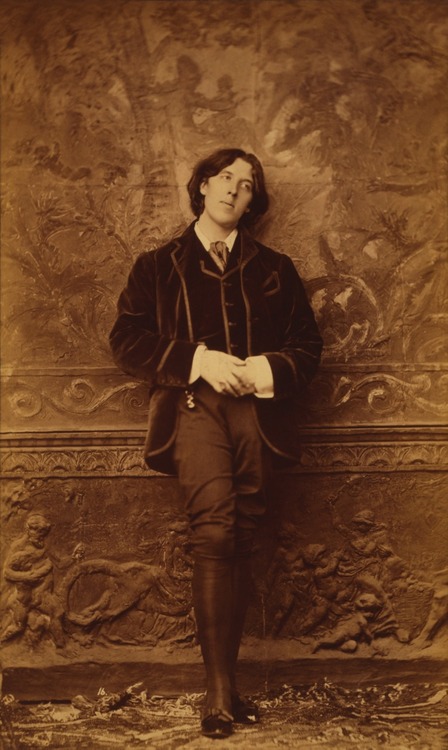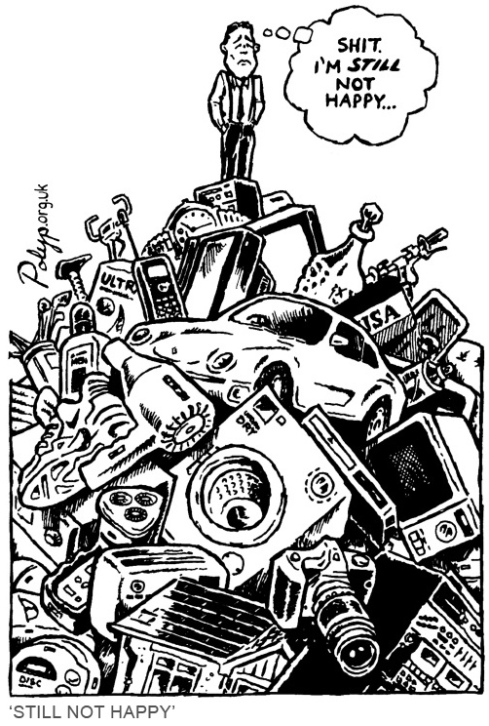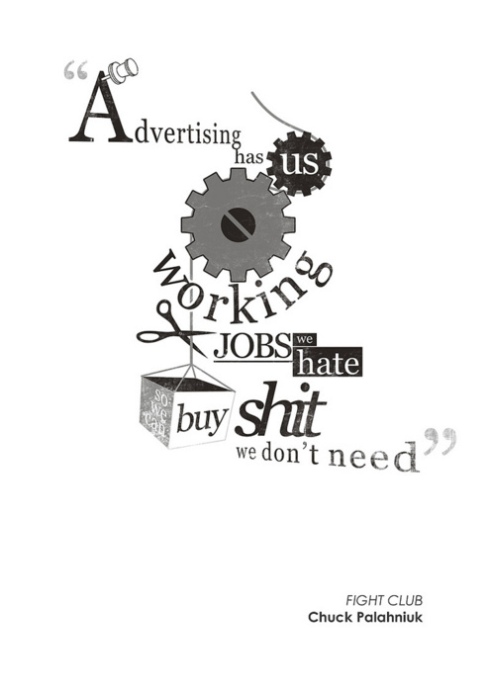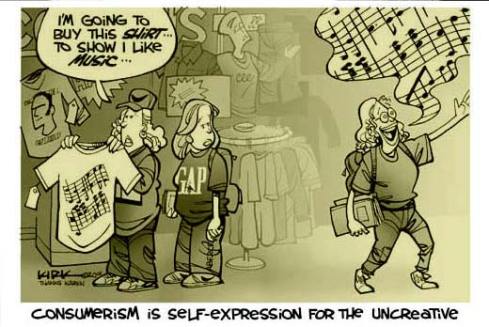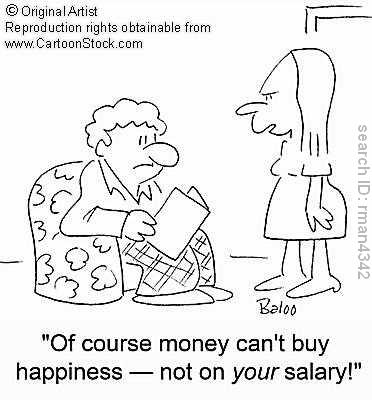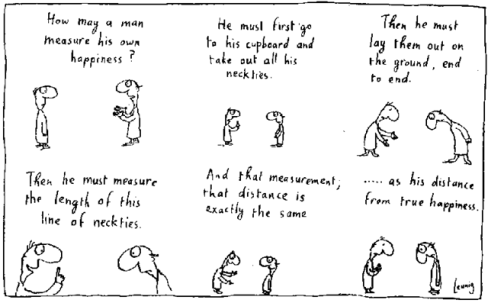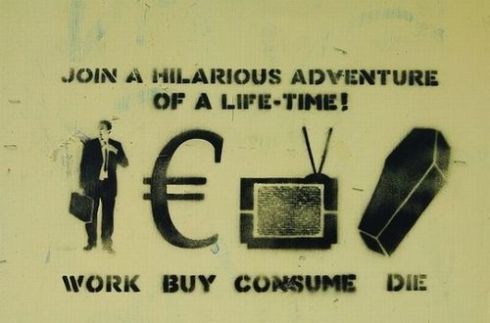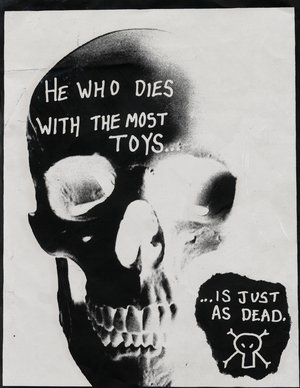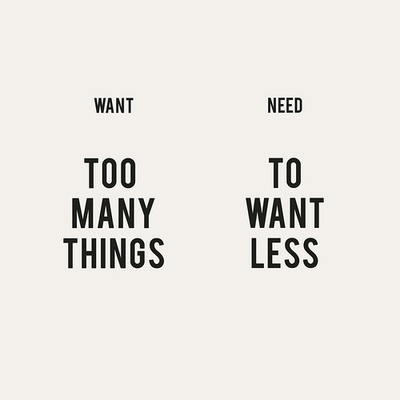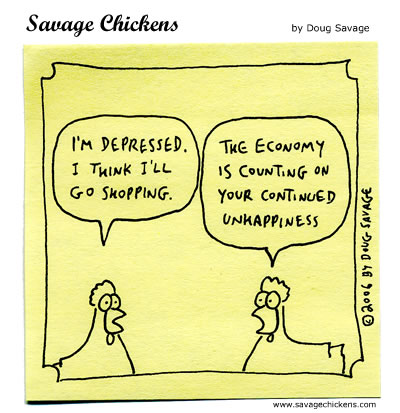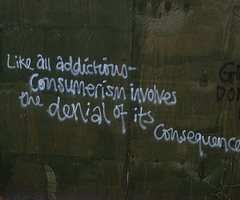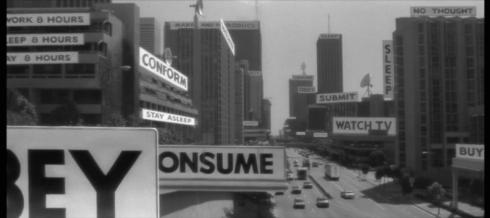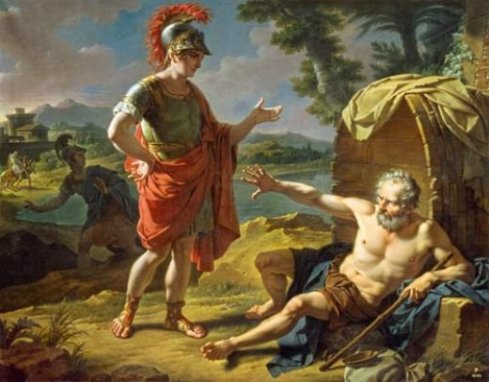These are a few of my favorite things: #42(A Serious Man)
“Most people think life sucks, and then you die. Not me. I beg to differ. I think life sucks, then you get cancer, then your dog dies, your wife leaves you, the cancer goes into remission, you get a new dog, you get remarried, you owe ten million dollars in medical bills but you work hard for thirty five years and you pay it back and then one day you have a massive stroke, your whole right side is paralyzed, you have to limp along the streets and speak out of the left side of your mouth and drool but you go into rehabilitation and regain the power to walk and the power to talk and then one day you step off a curb at Sixty-seventh Street, and BANG you get hit by a city bus and then you die. Maybe”
― Denis Leary
In ‘A Serious Man’ we meet Larry Gopnik( Michael Stuhlbarg), a physics professor whose life starts resembling the situation described in the above quote. His complacent & normal world starts falling apart from all directions. His wife of so many years has a fling (with a guy named Sy Ableman) & unreasonably expects Larry to move out of his own home while she files for a divorce,his son is a music buff n a pot addict, his daughter has started stealing money from his wallet for an expensive nose job, his sick, somewhat mentally retard brother has moved in with him, his neighbor is encroaching on his property, one of his students is trying to bribe him to give the student passing grades n someone is sending anonymous derogatory letters to the college committee while Larry is being considered for a tenure at the university. In short everything that can go wrong is going wrong in Larry’s life. As the movie proceeds he starts facing serious financial problems as he has to engage various lawyers to deal with divorce n neighbor etc. n then in a hilarious turn of events his wife’s suitor dies n wife expects Larry to pay for his funeral. Larry just can’t understand why all this is happening to him especially when, “I didn’t do anything”. This assertion is very heart breaking but starts to acquire comical proportions when he forgets to do anything to get his tenure, he doesn’t do anything, he doesn’t even publish research papers that are so crucial in academia. In trying to make sense of his troubles he tries to meet three rabbis but their advice proves to be superfluous, irrelevant, unhelpful n even laughable. So our guy Larry’s life is growing more n more pathetic n confusing but this may be just the beginning of trouble! Things do start to get a little better for Larry but only to get worse. There is some calmness before the real storm hits him hard. He finally succumbs to the lure of money offered by bribe n no sooner than he changes the student grade from F to C he receives a call from his Doctor who wants to discuss Larry’s X-Ray Report which is apparently too grave to be discussed on phone. n in another shot his son gets caught in a tornado. So there is no happy ending here. Welcome to reality.
The underlying question in the story of Larry n in all our life stories is why do bad things happen to good people?(This movie is a modern retelling of ‘The Book of Job‘) n when bad things happen how are we supposed to feel n react. Larry’s situation is appropriately highlighted by the Jefferson Airplane Song: When the truth turns out to be lies n all the joy within you dies, don’t you want somebody to love; Schrodinger’s cat n Heizenberg’s Uncertainity Principle.
The Uncertainty Principle.
It proves we can’t ever really know…
what’s going on.
So it shouldn’t bother you. Not being able to figure anything out. Although you will be responsible for this on the mid-term.
Related articles
- My Queue Reviews: A Serious Man (2009) (andthosewhocant.wordpress.com)
- “A Serious Man” 2009, Joel & Ethan Coen (movieladyme.wordpress.com)
- Top 10 Coen Brother Films (jordanandeddie.wordpress.com)
These are a few of my favorite things: #39(Walden on Wheels : On the Open Road from Debt to Freedom by Ken Ilgunas)
This book takes us on an inspiring journey as we get to know how the author Ken Ilgunas frees himself from a massive educational loan by following the simplicity n frugality model of Thoreau’s Walden.
I was drawn to the book for 3 main reasons. First, I found Ilgunas’ desire to live super frugally in order to pay his loans Very refreshing. This is totally opposite of what I see the kids doing in India(majority though definitely not all). Parents here finance the most expensive education of kids, even taking loans in their own names. & after that if these kids don’t get a high paying job which they feel they deserve, they won’t pick up some small jobs to support themselves + they never dream of cutting down their royal extravagant lifestyle. They must have all the luxuries: expensive gym memberships, expensive food items. Even after draining their parents financially, they behave irresponsibly, can’t be bothered to switch of lights n fans even when not in use (electricity bills be damned, after all parent will be paying for that too in any case), they can’t even pick up after themselves or do things around home (they need to have their personal servants). The standards of living of these shameless, self entitled youth is very high. Ken Ilgunas is indeed the role model this generation needs.
Second I’ve always admired Thoreau’s experiments in solitude, simplicity & frugality.
Third I find the calm, quite life full of simplicity, solitude & grace which the author led far more desirable & charming than the grotesque life of the Filthy Rich n Famous
Here is an excerpt from the book:
My experiment began in the spring semester of 2009 when I enrolled in the graduate liberal studies department. Months before, I had just finished paying off $32,000 in undergraduate student loans — no easy feat for an English major.
To pay off my debt, I’d found jobs that provided free room and board. I moved to Coldfoot, Alaska — 60 miles north of the Arctic Circle and 250 from the nearest store — where I worked as a lodge cleaner, a tour guide and a cook. Later, I worked on a trail crew in Mississippi in an AmeriCorps program. Between jobs I hitchhiked more than 7,000 miles to avoid paying airfare. When I couldn’t find work, I moved in with friends. My clothes came from donation bins, I had friends cut my hair, and I’d pick up odd jobs when I could. Nearly every dime I made went into my loans.
I hated my debt more than anything. I dragged it with me wherever I went. While I was still leading an exciting, adventurous life, I knew I could never truly be free until my debt was gone.
I finally got out of the red when I landed a well-paying job with the Park Service as a backcountry ranger. Finally, after two and a half years of work, my debt was gone. I had four grand in the bank that was mine. All mine. It was the first time I had actual money that hadn’t been borrowed or given to me since I was a 13-year-old paperboy.
The more money I had borrowed, I came to realize, the more freedom I had surrendered. Yet, I still considered my education — as costly as it was — to be priceless. So now, motivated to go back to school yet determined not to go back into debt, I had to think outside the box. Or, as Henry David Thoreau might suggest, inside one.
In “Walden,” Thoreau mentioned a 6 foot-by-3 foot box he had seen by the railroad in which laborers locked up their tools at night. A man could live comfortably in one of these boxes, he thought. Nor would he have to borrow money and surrender freedom to afford a “larger and more luxurious box.”
And so: I decided to buy a van. Though I had never lived in one, I knew I had the personality for it. I had a penchant for rugged living, a sixth sense for cheapness, and an unequaled tolerance for squalor.
My first order of business upon moving to Duke was to find my “Walden on Wheels.” After a two-hour bus ride into the North Carolinian countryside, I caught sight of the ’94 Ford Econoline that I had found advertised on Craigslist. Googly-eyed, I sauntered up to it and lovingly trailed fingertips over dents and chipped paint. The classy cabernet sauvignon veneer at the top slowly, sensuously faded downward into lustrous black. I got behind the wheel and revved up the fuel-funneling beast. There was a grumble, a cough, then a smooth and steady mechanical growl. It was big, it was beautiful, and — best of all — it was $1,500.
I bought it immediately. So began what I’d call “radical living.”
My “radical living” experiment convinced me that the things plunging students further into debt — the iPhones, designer clothes, and even “needs” like heat and air conditioning, for instance — were by no means “necessary.” And I found it easier to “do without” than I ever thought it would be. Easier by far than the jobs I’d been forced to take in order to pay off my loans.
Living in a van was my grand social experiment. I wanted to see if I could — in an age of rampant consumerism and fiscal irresponsibility — afford the unaffordable: an education.
I pledged that I wouldn’t take out loans. Nor would I accept money from anybody, especially my mother, who, appalled by my experiment, offered to rent me an apartment each time I called home. My heat would be a sleeping bag; my air conditioning, an open window. I’d shower at the gym, eat the bare minimum and find a job to pay tuition. And — for fear of being caught — I wouldn’t tell anybody.
Living on the cheap wasn’t merely a way to save money and stave off debt; I wanted to live adventurously. I wanted to test my limits. I wanted to find the line between my wants and my needs. I wanted, as Thoreau put it, “to live so sturdily and Spartan-like as to put to rout all that was not life … to drive life into a corner, and reduce it to its lowest terms.”
Not only is his story of adventure very gripping n absorbing, but the book is peppered with little gems of wisdom like these:
“Reading sixteenth-century French poetry, suffering through Kant, and studying the finer points of the Jay Treaty may seem to be, on first appearance, completely, utterly, irrefutably pointless, yet somehow in studying, discussing, and writing about these ‘pointless’ subjects, the liberal arts have the capacity to turn on a certain part of the brain that makes us ask ourselves questions like:
Who am I? What’s worth fighting for? Who’s lying to us? What’s my purpose? What’s the point of it all?
Perhaps many students would rather not be irritated with these questions, yet being compelled to grapple with them, it seems, can make us far less likely to be among those who’ll conform, remain complacent, or seek jobs with morally ambiguous employers” (p. 243).
“Discomforts are only discomforting when they’re an unexpected inconvenience, an unusual annoyance, an unplanned-for irritant. Discomforts are only discomforting when we aren’t used to them. But when we deal with the same discomforts every day, they become expected and part of the routine, and we are no longer afflicted with them the way we were…Give your body the chance to harden, your blood to thicken, and your skin to toughen, and you’ll find that the human body carries with it a weightless wardrobe. When we’re hardy in mind and body, we can select from an array of outfits to comfortably bear most any climate”
This book would be of huge interest not only for students, but for anyone seeking simple, spartan, frugal n calm way of living. We need more young guys like Ken Ilgunas n we need more inspirational tales like this.
Related articles
- Walden on Wheels (sort of review) (ellenannelarson.wordpress.com)
- Walden on Wheels (intrepiddebt.wordpress.com)
- Walden on Wheels and back to the grind… or not? (ellenannelarson.wordpress.com)
- Blogging Walden: Economy (writingsenses.wordpress.com)
- Walden Pond (deliberatelivinginboston.wordpress.com)
- Walden II (philippmasur.wordpress.com)
- How I Paid Off My Loans: 3 Crazy-but-True Stories (thedailymuse.com)
- Book recommendation: Walden on Wheels (fiscallyfitchica.com)
- Walden on Wheels: terrific book (backwoodshome.com)
- WALDON ON WHEELS by Ken Ilgunas – Criticism (muymue.wordpress.com)
These are a few of my favorite things: #38(Queen of Versailles); Quitting the Rat Race #19
Queen of Versailles is a peek into the (sad & pathetic) lives of (filthy) Rich n Famous. We always try to speculate whether money buys happiness or not. We philosophize & wonder about it. We reason n we argue. There is no definitive answer to this quest. Everyone has their own hypothesis n conclusions. Now this Award winning Documentary by Lauren Greenfield gives us an excellent lens to see things with our own eyes. n then decide!! It’s a commentary on the emptiness of consumerism driven life & failure of the American Dream.
The Queen of Versailles” began as a documentary about a time-share billionaire, his ditzy wife, and their grotesque quest to build the largest house in the United States of America. It ended as perhaps the single best film on the Great Recession.”
The Siegels have a plan to build a 90,000 square feet home, bigger than the White house n modeled on the Palace of Versailles, ‘cos their life can no longer fit into the 26,000 square feet home!! Now just look at what all it will have when finished:
When completed it will have:
-
15 bedrooms
-
30 bathrooms, each with a full-sized jacuzzi tub
-
10 kitchens and a sushi bar
-
Bowling alley
-
Baseball field
-
2-3 Theater sized Entertainment Centres
-
Roller-skating rink
-
Arcade
-
3 swimming pools
-
Fitness center
-
Spa
-
20 car garage
-
Staff Quarters
10 Kitchens!! Are you fucking kidding me? I mean what do you need 10 kitchens for?? Reminds me of one of my favorite stories, ‘The Billionaires‘ by Maxim Gorky in which he wonders what do billionaires do with all the wealth..Do have stomachs twice/thrice the size of normal people? or do they have more mouths?? or maybe more teeth!
Now about the Siegels:
David Siegel is the founder n owner of Westgate, the pioneer n biggest player in Timeshare holiday industry. He is 74 something. He married Jackie, a beauty pageant winner n 30 years his junior when he was 60. Together they have 8 children!!!. Jackie has a fondness for shopping n she shops things by truckloads (or rather limousine loads) when the stuff is already overflowing in their huge mansion. There are too many children, too many (neglected) pets,too many nannies n housekeeping help n too much clutter, n too little appreciation for anything, n no Savings. Obviously they fly in their Private jets n when the recession hit their fortunes, the ‘poor’ folks had to fly commercial…one of the son asks, ‘What are all these people doing in our plane?’ !!
David says everyone wants to be rich,if they are not rich, they want to feel rich n if they don’t want to feel rich, they are dead!!!
But is he himself happy with all this wealth and opulence?? The Answer comes from the horses mouth. David openly admits to the camera that nothing makes him happy any more. Asked if he draws strength from his marriage, he flatly replies, “No.” Finally , some sense starts to prevail when it becomes clear to him that recession has actually hit them too. Then he is like a normal middle class person getting worried about electricity bills, Housing staff is cut down drastically, but regardless the X’mas shopping n party are celebrated with fanfare.
As a person who actually enjoys frugality n living beneath the mean,I really don’t understand a lifestyle filled with so much extravagance n wastage. Period. Even if I had billions n trillions I would really want to stay the way we live now. The big mansions don’t even excite me. I dream of shifting into smaller n smaller homes n finally ending up in tiny house (1100 square feet). Tiny houses n simple lifestyle with low footprint is what excites me. I am not even interested in how their life fell apart during recession…I don’t like that extravagant n wasteful lifestyle even if had continued being so without hiccups. That kind of lifestyle is empty n hideous. I’m simply not interested in too much money, ‘cos all it gets you is a super ugly gold throne. I’m happy lounging in my easy chair, reading books n daydreaming.
Related articles
- Queen of Versailles Jackie Siegel wants a reality show: bad idea (realityblurred.com)
- The Queen of Versailles (goodeveningclarice23.wordpress.com)
- Queen of Versailles – Movie Review (simplyjosephine.net)
- The 11 Best Movies Of 2012 (buzzfeed.com)
These are a few of my favorite things: #37 (Picture of Dorian Gray-Oscar Wilde)
Though Oscar Wilde is more famous for his witty one liners which are abundantly present in ‘Picture of Dorian Gray’,what makes this work memorable for me is the exploration of the inner psyche of the eponymous protagonist.
Basil Hallward, an artist, paints a very beautiful portrait of his friend Dorain Gray.
Gray himself develops a narcissistic kind of appreciation for his own portrait & thinks:
& his wishes do indeed come true. So it follows that whatever vile thoughts he thinks & deeds he does his face remains innocent & stays as handsome as ever.He becomes too hedonistic & stops caring for the feelings of others. He starts ignoring the effect of his actions on people close to him. When his fiancee Sybil Vane commits suicide because Dorian decided to dump her for a frivolous reason, he remains nonchalant. Then he goes n murders his friend, Basil n also Sybil’s brother James. The painting becomes uglier n uglier with each misdemeanor.
Now this is really interesting a human face is indeed a mirror of the inner self of the person. Beauty or ugliness is not just physical features but also reflects the person’s inner life & the quality of thoughts. (Sin is a thing that writes itself across a man’s face. It cannot be concealed.)
Sadly this fact is not at all accounted by our beauty n youth obsessed society. Many people act like Dorian Gray(“Youth is the only thing worth having. When I find that I am growing old, I shall kill myself.” “I know, now, that when one loses one’s good looks, whatever they may be, one loses everything.”~Dorian Gray) n make huge efforts (even resorting to painful n expensive surgeries) to remain ever youthful. But, alas their inner emptiness is reflected in their face despite impeccable features.
To continue with the plot of the story, finally inner demons begins to catch up with Dorian n one day he himself is disgusted by the ugliness of his portrait & decides to destroy it. As he stabs his painting, Dorian becomes ugly n old n dies n the portrait returns to it’s initial beauty & splendor. The message is quite clear: As Ayn Rand once said, ‘One can evade reality, but one can never evade the consequences of evading reality.
P.S. : It is widely regarded that Dorian became irresponsibly hedonistic n degraded under the influence of his friend Lord Henry Wotton. I’ve totally ignored that aspect because I believe in ultimate responsibility of an individual for his own thoughts & action. One cannot blame others. One should be mature & wise to understand what advice to follow & what to ignore.
Okay, now having dealt with the story n it’s nuances,let’s sample the signature Oscar Wilde Witticism, which peppers the book throughout especially through Lord Wotton:
“Behind every exquisite thing that existed, there was something tragic.”
“Humanity takes itself too seriously. It is the world’s original sin. If the cave-man had known how to laugh, History would have been different.”
“we always misunderstood ourselves, and rarely understood others”.
“Experience is merely the name men gave to their mistakes.”
“Some things are more precious because they don’t last long.”
“Always! That is a dreadful word. It makes me shudder when I hear it. Women are so fond of using it. They spoil every romance by trying to make it last for ever.”
“It is perfectly monstrous,’ he said, at last, ‘the way people go about nowadays saying things against one behind one’s back that are absolutely and entirely true.”
“It is only shallow people who require years to get rid of an emotion. A man who is master of himself can end a sorrow as easily as he can invent a pleasure. I don’t want to be at the mercy of my emotions. I want to use them, to enjoy them, and to dominate them.”
He thought for a moment. “Can you remember any great error that you committed in your early days, Duchess?” he asked, looking at her across the table.
“A great many, I fear,” she cried.
“Then commit them over again,” he said, gravely. “To get back one’s youth one has merely to repeat one’s follies.”
“A delightful theory!” she exclaimed. ” I must put it into practice.”
These Are a Few of My Favorite Things: #34 (Right Here, Right Now: A Short Film by Anand Gandhi)
Pondering over the imponderables like the meaning of life, Karma, etc is one of my favorite things. As is the nature of such enquiry I get no definite answers but these exercises help me shape my personal ethics n value system.
Karma is the basic law of cause & effect: As we sow, so we reap. Intuitively we all know that Karma seems to be a basic law operating all our actions but at times I wonder, is it so really? n if it indeed does, then how exactly? The thing about karma is that it is sometimes hard to discern it’s effect because Karma weaves a complicated Web. It’s not a simple case like we get wet in the rain n we catch flu the next day.
Right here, Right Now, a short film by Anand Gandhi (Who is currently making huge waves with his Magnum Opus, ‘The Ship of Theseus’) explores this complex web of Karma rather brilliantly. A good story can convey obscure ideas more powerfully than anything else. An ounce of story is worth tons of theory.
A young man in his haste to go some place takes two actions – he screams at his mother for making him late, and he lovingly appreciates his brother’s painting. By doing so, he strikes off two cycles – one of frustration and sorrow and the other of love and joy. His mother vents out her anger on her maidservant. His brother gifts the painting to his girl friend. Thus begins the cycles of sorrow and joy, forming a Domino stairway, leading to an unknown doorway. After shaking hands with 15 other characters and traveling through 17 locations, in just two shots, both the cycles meet at the end in an attempt to give a logical understanding to the seemingly absurd human life. It’s a humorous look at the bizarreness of the cosmic accident, otherwise known as life.
Related articles
- Ship of Theseus (The Film): A Philosophical Exploration (ritusthoughtcatcher.wordpress.com)
- Review of 2013 Film ‘The Ship of Theseus’, a ‘Hinglish’ Film Directed by Anand Gandhi; Starring Aida Al-Khashef Neeraj Kabi and Sohum Shah (sashankkini.wordpress.com)
- Ship of Theseus: The Most Original Indian Indie Film (madaboutmoviez.com)
- ‘Ship Of Theseus’ simplifies the complex ideas: Anand Gandhi (ibnlive.in.com)
- Ship of Theseus: This one is too Special (cinemaunchained.wordpress.com)
- Karma – Cause and effect (chaitanyaiimc.wordpress.com)
- Ship Of Theseus (bumblebee31.wordpress.com)
- Is the Ship a Trojan horse? (thehindu.com)
Ship of Theseus (The Film): A Philosophical Exploration
Ship of Theseus:
After a long long time there comes a movie which is intellectually stimulating & which stays with you beyond the 2.5 hrs in the movie theatre. It makes you think and think and think……… ‘Ship of Theseus’ by Anand Gandhi belongs to this rare category.
The intrigue of this movie starts with the title itself, ‘Ship of Theseus’ also called ‘Theseus Paradox’.
The paradox engages in the idea of identity: “If parts of an object are replaced with similar parts, does it remain the same?” (In ancient times, there was a ship, called the “Theseus” after its famous former owner. As the years wore on, the Theseus started getting weak and creaky. The old boards were removed, put into a warehouse, and replaced with new ones. Then, the masts started tottering, and soon they, too, were warehoused and replaced. And in this way, after fifty years, this ship now has all new boards, masts, and everything. The question then arises: Is the ship in the harbor, now called S2, the same ship as the ship that was in the harbor, fifty years ago (called S1, for convenience)? In other words, is S2really the “Theseus”?~ Wikipedia). A simplified way to express the same thought is ‘George Washington’s Hammer’: A guy is admiring a hammer at an antique shop, he is informed by the dealer that it belongs to George Washington, so the guy says it’s in a pretty good condition considering it’s rather old age to which the dealer says sincerely, why should it not be considering he had replaced it’s head twice n it’s handle thrice. 😀
The film also refers to ethical issues brought out by applying the Theseus paradox to human beings, “All the cells in a person’s body regenerate entirely in seven years. An individual goes through a shift psychologically, ideologically and physically. Is it still the same person?”
Main theme is the theme of identity…or what makes Me, Me? What makes You, You? What makes Us, Us?? If some of our organs are replaced we are still the same person. That means we are something more than the sum total of our body parts..who are we then? Are we our thoughts? But even the thoughts theory is not satisfactory ‘cos as I look back on my life most of my thoughts n behavior patterns have changed totally. I have transitioned from a shy teenager to a confident Professional to a laid-back oops a hard working 😉 housewife and yet I am the same person that I used to be!! Even my passions have changed completely. Earlier I was a bookworm, then I became a travel enthusiast & a fashionista, now I’m more into cooking n yoga etc..yet I remain the same person! This thought is mind boggling to me at this moment. This argument builds a strong case for the existence of a Soul. Despite the changes in physiology n psyche it is the soul that provides continuum to a living object as a single identity. (Ask yourself this one. I was born John Doe.<Insert your own name in place of John Doe> The cells and organs in our body die off and become entirely new cells every 7-10 years. In essence, I become an entirely new person every decade. At age 80, am I still John Doe? Am I still that tiny infant? Some would argue no, but following my line of prior reason, we are ourselves for our entire life, because of emotional memory.)
Several other themes like Atheism, Ethics, Compassion, Vegetarianism, limits of human goodness, Death, Soul, Reincarnation etc. are explored.
The movie comprises of 3 stories which are beautifully weaved together as the movie approaches its end. The first story is the story of a blind photographer n how her Art changes as she regains her vision. Is she a different person with eyes than what she was before?(“A frog once asked a centipede how is it able to walk on a hundred feet, so gracefully synchronized while the frog finds it difficult to manage even two. The centipede took a moment to analyze its own walk and was baffled. So as it tried to walk further its feet got entangled and it tripped.” – Aliya in Ship of Theseus)
The second story is about Maitreya (Neeraj Kabi) ,an Urbane, suave, good-natured, rational, compassionate, atheist monk!, as he faces the dilemma of choosing between his ethics (compassion towards all living beings n not just human being) and his very life. The Philosophy of the Monk is Brilliantly captured in the Song ‘Naham Janami’ . This is the Quintessential Atheist Anthem. By large Atheists are a misunderstood lot. We are accused of behaving as we please in the absence of fear of God. But Atheist Ethics are stronger than blind faith ‘cos we take responsibility for all our actions and our firm belief in ‘cause & effect’. This part has some very Cerebral & witty conversation between Maitreya & a young Lawyer Charvak . Charvak asks Maitreya a question which I too have pondered for many years. How does one reconcile the paradox of existence of soul and reincarnation without the existence of God?? Buddha too propounded that there is no God but asserted about Reincarnation. Maitreya initially held Buddha’s view on the matter but later as he grew physically n emotionally exhausted he admits that he doesn’t know anything definite about the existence of soul. (Charvak:”you say you’re an atheist and at the same time you believe in the concept of soul, which I think is rather convenient. I don’t think karmic causality is a reason enough for anybody to behave ethically. You know, that there is retribution of any kind in this life or any other. It’s like a weak man’s hope for some kind of cosmic revenge.”)
(Charvak:”We invent God, soul… heaven, afterlife…even life-imitating technology, all sorts of transcendence to cope with the idea of an absolute end. And then, we die for an idea that promises us some sort of immortality.”)
(Charvak:– “Exactly. See, it’s pretty clear how inconsequential our actions are in the larger scheme of things.”
Maitreya- “Main is baat se sehmat nahi hoon. Hamaare har kaam ka prabhav karaakash mein rehte har parmanu par padta hai. Agar yeh baat sach nahi, toh phir sab nirarthak hai. What is the sense of existence then? The hedonism and nihilism of your namesake, Charvaka?”)
(Maitreya- “You see, in his world, it’s not all humanity that’s equal, it’s all existence that’s equal.”)
The third story is of Navin (Sohum Shah, also the co producer of the movie), a stockbroker, who has his kidney transplanted. He apparently loves only money & is shown doing his business even when critically ill ,as opposed to the so called finer things like music, literature et al which his Granny(Ajji) would like him to explore & appreciate. But as the narrative progresses he shows great empathy n compassion for a poor bricklayer whose kidney has been stolen.
(Navin-‘Kuch ho nahi paaya’
Ajji-‘Jitna kuch hua, kyunki tumne kuch kiya. Itna hi hota hai’)
Everything about this movie is immaculate and Superlative. The Script, Direction, Acting, Cinematography, Subtle Humor, The Underlying Philosophy, and The Very title of the Movie.
Also read about my other all time favorite movies:
The Groundhog Day
Babel
Guzaarish
Peepli Live
Chalo Dilli
Related articles
- VOTE and DEMAND “Ship Of Theseus” in your city (moifightclub.wordpress.com)
These are a few of my favorite things: #28 (The Hermit by Eugene Ionesco)
The Hermit by Eugene Ionesco
I love everything about this book, starting with the title ‘The Hermit’…the word Hermit is so beautiful n peaceful. To me it signifies one who has found value in one’s own company.
(Great minds are like eagles, and build their nest in some lofty solitude.~Arthur Schopenauer;
Language has created the word loneliness to express the pain of being alone, and the word solitude to express the glory of being alone. ~Tillich, Paul)
I was immediately attracted to the Title of the book a couple of years back (& I reread it just now). At that time I did not in any way know about the Genius of Eugene Ionesco or that I would start loving his absurd plays.
Then there is the most wonderful opening sentence of the novel:
At thirty-five, it’s high time to quit the rat race. Assuming there is a rat race. I was sick & tired of my job. It was already late: I was fast approaching forty. If I hand’t come into unexpected inheritance I would have died of depression & boredom.
(Now it is a coincidence that I too gave up the rat race if there was any rat race for me to begin with at 35, not that I was bored of my job…I was thoroughly enjoying my stint as a teacher but there came a time when I said to myself enough was enough…already time to quit n explore new things..the new things being doing nothing but devoting a large part of my time to thinking n philosophizing, devoting time to explore n adopt a simpler way of living, a frugal way, a Zen way, a quiet way, far from the madding crowd, far from the white noise of the society n confirmity )…so our unusual protagonist retires at 40 & devotes his time to ponder over the existential issues & the real meaning of our lives, not the superficial or mundane but the actual why n how of the human existence. He devotes his time to ponder over the nature of time, memories, death, infinity of the Universe, n such. Most people would regard him as eccentric n that is the general opinion of people towards him in the novel…sample these conversations & interactions of the narrator with various people:
~ I have a suspicion that the way I lived, the way I acted, rarely if ever going out, must have struck to her as odd. She made a number of allusions to my inactivity. According to her, I had no right to be retired in the first place. Not at my age anyway.
~Yes, that was it: they are all hostile towards me. What did they have against me? The fact that I didn’t live the way they did; that I refused to resign myself to my fate.
~She asked me questions that were vaguely indiscreet: “So it’s you again! Where are you going at this time? You always seem to be going out. And yet it’s safe to say you’re not going to work. You are lucky. Not like the rest of us.”
& the Best of all
~ I was about to drift off when Jeanne (His maid) came into the living room. As she rubbed the furniture to make it shine, she upbraided me, telling me that the life I led was unhealthy. Wasn’t I going to buckle down & find some work for myself ? All right, so I had an inheritance. That’s no reason to sit around and do nothing all day. At least get married. Did I intend to go on living all alone like some impotent? I ought to start a family. I should have children. Man is made to have children, and there is nothing cuter than little ones underfoot. And then when they grow up and you grow old, they don’t abandon you to poverty; no, they reach out a helping hand when you need it the most. If there’s anything worse than living alone, it’s dying alone, with no one around to offer you a little milk of human kindness. I didn’t know what was in store for me. As for herself, she had a husband she didn’t get along too well, but now he was sick. They had had a child, a boy they had brought up with tender loving care, he had a heart of gold, only he had gone away and left them; he had a heart of gold, it was only because of that wife of his. They hadn’t heard from them in a long time. Apparently they had a baby. She had also had a daughter whom they had raised with similar loving care. A lovely girl. That is, she had been. But she too had a baby, only the baby had died. After that she deserted her husband. She came back home for a while, then left again, she had begun living fast n loose, from all that they had heard. Some cousins were in contact with her and kept them informed. Apparently she was on drugs. Children are ungrateful! You bleed yourself white for them, they aren’t all that easy to bring up in the first place and then when they grow up they go away and leave you, forget you: the best thing is not to have any. You’d better not count on them to show you any gratitude in the time of need.
I told her I was sure she was right. That didn’t stop her, she was still talking, with the dustrag in the right hand while she gesticulated with her left. She made me promise to marry and have children.
This conversation with Jeanne is perfectly classic Non-Sequiter dialogue in which Eugene Ionesco excels. The maid has not too good experience with her own children & yet she wants our guy to marry n have children. Somehow everyone is uncomfortable with anyone who leaves the race of conformity n who wants to live life on his/her own terms, then everyone will jump over each other n try to convince her/him to make the conventional choices no matter how badly they themselves are faring in life with their conventional/conformist choices. I too find myself on receiving end. People try to convince me that I must be bored to be staying at home all day n doing nothing since I don’t have any children either. No matter how happy I am & I look they are not convinced. How can I be happy until I am behaving like everybody else? Unless I have a fancy Job Title n a fat pay packet?
And one more thing is that people never value anything we do for it’s own sake. Not for making money but for the joy of doing the thing, like Vincent Van Goh painting his master pieces none of which sold during his life time. He said he painted for the sheer joy of painting regardless of them not selling. People can’t accept the fact that a guy wanna leave his job n focus on his inner life.
But I admire him for his ability to quit, afterall all of us know many people who crib about Monday mornings n enjoy life only on weekends n yet they can’t give up their lousy jobs ‘cos they gotta buy stuff to impress the people whom they don’t like’…that urge seems to be powerful for the masses of people.I guess it’s very easy to quit the drudgery of work if one wants to follow a simple n frugal life. Our guy (he remains unnamed in the novel) doesn’t squander money on big n fancy things like flashy car or luxury villa or such but just buys himself a modest flat where he can be with himself
I found his character intriguing in it’s aloofness. He tends not to think too much about other people. He is very much attached to his girlfriend upto the extent a person of his nature can be attached to anyone. Yet when she leaves him he has great difficulty in recalling her name…he’s always like ‘I miss Yovne or was her name Marie?!! In this sense he reminded me of another of my favorite character Meursault from ‘The Stranger’ by Albert Camus (“Mother died today. Or maybe, yesterday; I can’t be sure.”)
I like this novel for what goes inside the mind of the narrator. This book is not for anyone who likes suspense/thriller. I never like that kind of books where you are on tenterhooks as to what will happen next. I could not care less for a whodunit. My kind of book is that in which nothing happens…just life goes on at it’s own pace n that’s it. So no wonder I found this book extremely satisfying.
Related articles
- These are a few of my favorite things: #26 (The Bald Soprano by Eugene Ionesco) (ritusthoughtcatcher.wordpress.com)
- Postcard from Wonderland (storyofalice.wordpress.com)
- Explain Yourself (farthertogo.com)
- How to Live like a Writer (literatureandlibation.com)
- Review: ‘The Chairs’ at Cutting Ball Theater (theatrestorm.com)
- Rhinoceros (morningstaronline.co.uk)
- Belief and Wonder – Or Why I Love the Fantastic (follownopath.com)
These are a few of my favorite things: #22 (Happy Days by Sameul Beckett)
Happy Days by Sameul Beckett
Happy days is an Absurd play by Samuel Beckett who is best known for ‘Waiting for Godot’. Happy days is the story of Winnie, a woman who is trapped waist down in a mound of earth. As she begins her day she declares it to be another lovely day, a rather strange assertion for someone in her situation. She has a huge bag in which she has an assorted nick-nack of items, her toiletries, a hat, an umbrella, a revolver, etc. Burried in a nearby mound is her husband Willie. Throughout the day Winnie keeps herself busy with her possessions in the handbag & engaging in a long monologue while Willie is busy with his newspaper n occasionally grunts in response (eh, this is how all husbands indeed are, whether in an absurd play or in real life (and there is nothing more absurd than real life after all)!! This is the situation of most married people, the wife chatters n the husband suffers her chatter,is engrossed with newspaper n grunts in response occasionally).
As the Act II of the play begins, Winnie is now buried neck deep inside the earth but continues her life in the same fashion, as optimistic as ever.What makes this play extraordinary n poignant is that the story of Winnie underlines the general human condition, it is the story of all of us. We all get stuck in certain situations in our life n we try to take it in our stride by calling it our inescapable fate. (Fate is like a strange, unpopular restaurant filled with odd little waiters who bring you things you never asked for and don’t always like.~Lemony Snicket). Despite it all we try to resort to positive thinking n make the most of it anyways. There seems to be no other choice. This is the absurdity of our existence. And even as we keep repeating our positive mantras our lives as that of Winnie moves from bad to worse. I remember a joke which goes like this, a guy goes to an astrologer who tells him that his life will be very hard for 2 years…the guy asks will it improve after that? Nopes, says the astrologer, but you will get used to it!! So in life, nothing gets better but we learn to adjust.But the tragedy is that when we get used to our bad situation it grows even worse.
In a way we can say Winnie is trying to ignore the reality of her situation by being exuberant. This is both a good thing and a sad thing to do. Is it really wise to engage in the trivialities of contents of handbag? (in real life we are engaged in the trivialities of money, possessions, career, success while ignoring the real futility of all this, while the real issues in life are un-understood & unsorted we are like Winnie who says ‘There is of course the bag. There will always be the bag.). This is like trying to paint one’s house while it is on fire.
One more way of looking at Winnie’s predicament is realizing that sometimes in life we are not in a position to control our external environment but still we can control how we react to them & how we try best to cope up with our bleak reality. (everything can be taken from a man but one thing: the last of the human freedoms — to choose one’s attitude in any given set of circumstances, to choose one’s own way.~Victor Frankl). The Title of the pay is very ironic, the situation is not called sad days! This is the way our life seems to be designed, we have to extract our happiness from our life experiences. (Nothing is funnier than unhappiness, I grant you that. Yes, yes, it’s the most comical thing in the world.~Samuel Beckett)
Related articles
- Samuel Beckett: ten best quotes (telegraph.co.uk)
- “When we say that love is ineffable, as Beckett knew, what we mean is that, when we love, we don’t…” (exp.lore.com)
- Guest Blog: In Search of Samuel Beckett (interestingliterature.wordpress.com)
- Depressing books could be just what the doctor ordered (telegraph.co.uk)
- The strength of love in Haneke’s Amour (bengwalchmai.wordpress.com)
- Reviewed: Well Done God! Selected Prose and Drama of B S Johnson (newstatesman.com)
These are a few of my favorite things: #11 (Society by Jerry Hannan & Eddie Vedder)
These are a few of my favorite things: #11 (Society by Jerry Hannan & Eddie Vedder)
Society
It’s a mystery to me
We have a greed with which we have agreed
And you think you have to want more than you need
Until you have it all, you won’t be free
Society, you’re a crazy breed
I hope you’re not lonely without me
When you want more than you have, you think you need
And when you think more than you want, your thoughts begin to bleed
I think I need to find a bigger place
Cause when you have more than you think, you need more space
Society, you’re a crazy breed
I hope you’re not lonely without me
Society, crazy indeed
Hope you’re not lonely without me
This is a beautiful song both in music & in lyrics. Song for the people who refuse to be a part of the crowd. Our so called ‘society’ is nothing but crowds who have agreed pretty crazy & stupid definitions of happiness & success. Success is defined by one’s possessions & power. Whoever has the most stuff wins!! Looks pretty bad to me. No thanks, I’d rather be singing the song of my own soul than be caught up in this silly, mad frenzy. Society has no place for individuality. Those who live by their own rules are failures in the eyes of society. But ironically the so called successful people who played by society’s template of success (get good grades, slog your ass off in some stupid dumbass job that you pretend is very important, get married, produce 2.5 children, get a house, get 2 cars, go to exotic vacations, compete with the neighbors, compete with co-workers over who has more stuff, who eats out more, who vacations more n so it continues) are deeply unhappy & at a loss to understand why they feel so bad when they are doing all the ‘right’ things. This template looked non-sense to me from the beginning. Never appealed to me. I never felt the need to be a super-woman, to have it all. I’m my own person & that is more than enough for me. It’s really a mystery that people actually engage in all this n then they die without having known what is life really all about, what peace of mind is, what individuality is. How much happiness you can have sitting in your room, idly thinking, contemplating, gently communing with nature, taking things slow, living life at the pace of life n not running endless rat race. As Mark Twain noted, “Whenever you find yourself on the side of the majority, it is time to reform (or pause and reflect).”
Also see my other favorite: Soak up the sun
Related articles
- Lifestyle: 15 Powerful Things Happy People Do Differently (davidvalefitness.wordpress.com)
- Putting Words in Mark Twain’s Mouth (realclearpolitics.com)
- Lonely (awesomeelo.wordpress.com)
- 10 Great Quotes for Women (sweetlightstudios.wordpress.com)
Don’t Stay Hungry, Don’t Stay Foolish: Quitting The Rat Race #8
Stay Hungry, Stay Foolish
These are the last words of the last issue of the Whole Earth Catalogue published by Stewart Brand and his team. Steve Jobs used it in his 2005 commencement address at Stanford University.
Stay Hungry: means don’t be too easily satisfied or grow too comfortable; do not feel content with what you have already achieved but always feel hungry to do more and more.
It’s a widespread & widely accepted myth that staying dissatisfied with the status quo is a way to make progress & improve your-self. It is assumed that only hungry, dissatisfied people can move forward in life. I disagree with this point of view. Staying Hungry is just another method to stay stuck in the rat race, that cycle of consumerism & over-work!! Wisdom lies in Accepting the present moment in totality, being absolutely satisfied with the way things are, no struggling, only peace. Being grateful for the bounties of the present means being satiated & not perpetually hungry. Staying hungry is a recipe for perpetual dissatisfaction. Always wanting more, we become like a hungry ghost, a creature with a big mouth, a narrow neck, and a big belly, who is always hungry and can never get enough.
If we want serenity we should focus on the present moment & not scatter our attention on imaginary future.
The secret of health for both mind and body is not to mourn for the past, worry about the future but to live in the present moment
Do not dwell in the past, do not dream of the future, concentrate the mind on the present moment.
Buddha
Nothing ever gets anywhere. The earth keeps turning round and gets nowhere. The moment is the only thing that counts. ~Jean Cocteau
Forever is composed of nows. ~Emily Dickinson
A small child has no ambitions, he has no desires. He is so absorbed in the moment — a bird on the wing catches his eye so totally; just a butterfly, its beautiful colors, and he is enchanted; the rainbow in the sky… and he cannot conceive that there can be anything more significant, richer than this rainbow. And the night full of stars, stars beyond stars….
Innocence is rich, it is full, it is pure. Ignorance is poor, it is a beggar — it wants this, it wants that, it wants to be knowledgeable, it wants to be respectable, it wants to be wealthy, it wants to be powerful. Ignorance moves on the path of desire. Innocence is a state of desirelessness. ~Osho
…acceptance, total acceptance, means no desire. Desire arises out of nonacceptance. You cannot accept a certain situation, so desire arises. You live in a hut and you cannot accept it; this is too much for the ego, you want a palace – then you are a poor man, but not because you live in a hut, no. In huts, emperors have lived. Buddha has lived under a tree, and he was not a poor man. You cannot find a richer man anywhere. No, your hut doesn’t make you poor. The moment you desire the palace you are a poor man. And you are not poor because others are living in palaces, you are poor because the desire to live in the palace creates a comparison with the hut. You become envious. You are poor.~Osho
Whenever there is discontent, there is poverty; whenever there is no discontent, you are rich. And you have such riches that no thief can steal them; you have such riches, no government can take them by taxation; you have riches which cannot be taken away from you in any way. You have a fort for your being, unbreakable, impenetrable.
It is only possible to live happily-ever-after on a day-to-day basis. ~Margaret Bonnano
Enlightenment is the realization that we have only the present moment to live. The next moment is not certain — it may come, it may not come. In fact, the tomorrow never comes. It is always arriving and arriving, but never arrives. And the mind lives in the tomorrows… and life is possible only in the present.~Osho
I have realized that the past and future are real illusions, that they exist in the present, which is what there is and all there is. ~Alan Watts
Today is you own. Tomorrow perchance may never come by Swami Sivananda
When I am anxious it is because I am living in the future. When I am depressed it is because I am living in the past. ~Author Unknown
One of the most tragic things I know about human nature is that all of us tend to put off living. We are all dreaming of some magical rose garden over the horizon – instead of enjoying the roses that are blooming outside our windows today. ~Dale Carnegie
Pile up too many tomorrows and you’ll find that you’ve collected nothing but a bunch of empty yesterdays. ~The Music Man
Quitting the Rat Race #6: Watching the Wheels Go Round n Round!!!
‘Watching Wheels Go Round & Round’ by John Lennon is my new Anthem , like Lennon I too love to watch Wheels go round n round & watching shadows on walls which means basically doing nothing much, living at the speed of life!! So as I’ve mentioned before too, I’ve chosen to be a Homemaker after having a wonderful career for 10 odd years & I am enjoying this life to the hilt. The other day I was chatting with an old pal & he said he was ‘disappointed in me’ ‘cos I had let myself go n lost the zeal for life!!! I was surprised to hear this ‘cos I am actually happier now, my zeal is very much there, now that zeal is focused on other things like practicing simplicity, frugality, embracing the slow pace of life, clarifying my thought processes, eating healthy & exploring fashion, some things for which I didn’t just have time when I was busy with a career. But obviously most people just can’t understand that this way of life could make people not just ordinary Happy but deliriously Happy! People imagine Happiness means only climbing the ladder of career success & buying bigger n more n more expensive things … incidentally the same friend is about to buy a third SUV!!! I mean I can’t understand people buying one SUV but third, that’s ridiculous beyond imagination (..so perhaps I don’t understand them n they don’t understand me!!)
“I cannot tell if what the world considers ‘happiness’ is happiness or not. All I know is that when I consider the way they go about attaining it, I see them carried away headlong, grim and obsessed, in the general onrush of the human herd, unable to stop themselves or to change their direction. All the while they claim to be just on the point of attaining happiness.” ~Chuang Tzu
Enuff said…now off to Lalaland humming the great lyrics of great song!!! John Lennon reflects my state of mind uncannily
Watching The Wheel go round & round
People say I’m crazy doing what I’m doing
Well they give me all kinds of warnings to save me from ruin
When I say that I’m o.k. well they look at me kind of strange
Surely you’re not happy now you no longer play the game
People say I’m lazy dreaming my life away
Well they give me all kinds of advice designed to enlighten me
When I tell them that I’m doing fine watching shadows on the wall
Don’t you miss the big time boy you’re no longer on the ball
I’m just sitting here watching the wheels go round and round
I really love to watch them roll
No longer riding on the merry-go-round
I just had to let it go
Ah, people asking questions lost in confusion
Well I tell them there’s no problem, only solutions
Well they shake their heads and they look at me as if I’ve lost my mind
I tell them there’s no hurry
I’m just sitting here doing time
I’m just sitting here watching the wheels go round and round
I really love to watch them roll
No longer riding on the merry-go-round
I just had to let it go
I just had to let it go
I just had to let it go
Related articles
- Quitting the Rat Race #4: Killing the cycle of consumerism & (over) work (ritusthoughtcatcher.wordpress.com)
- Quitting the Rat Race #3: Inspiration from Lin Yutang (ritusthoughtcatcher.wordpress.com)
- Quitting the Rat Race #5: Can Money/stuff Buy Happiness? Putting Things in Perspective (ritusthoughtcatcher.wordpress.com)
- 4 reviews of Watching the wheels (rateitall.com)
- Quitting the Rat Race #1: Drawing Wisdom from Wise Philosophers: #1 Epicurus (ritusthoughtcatcher.wordpress.com)
- Quitting the Rat Race #2: Read ‘Possum Living’ & get Inspired (ritusthoughtcatcher.wordpress.com)
Quitting the Rat Race #5: Can Money/stuff Buy Happiness? Putting Things in Perspective
That is the lure of money: It lets people believe that they can be happy with money only if they have just a little more!!!
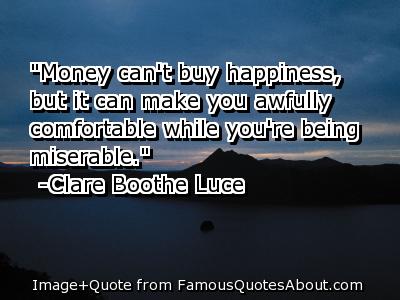
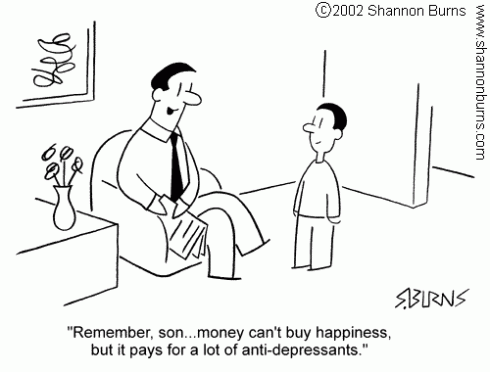 Yeah Money buys you stress n tension but not to worry it will come handy to buy anti-depressants !!!
Yeah Money buys you stress n tension but not to worry it will come handy to buy anti-depressants !!!
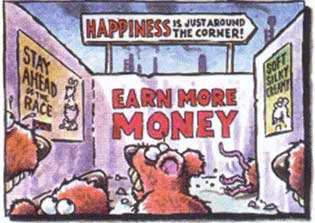 That is the lure of money: It lets people believe that they can be happy with money only if they have just a little more!!!
That is the lure of money: It lets people believe that they can be happy with money only if they have just a little more!!!
Related articles
- Quitting the Rat Race #4: Killing the cycle of consumerism & (over) work (ritusthoughtcatcher.wordpress.com)
- Quitting the Rat Race #3: Inspiration from Lin Yutang (ritusthoughtcatcher.wordpress.com)
- Quitting the Rat Race #2: Read ‘Possum Living’ & get Inspired (ritusthoughtcatcher.wordpress.com)
- Revisiting child Freedom (ritusthoughtcatcher.wordpress.com)
- Quitting the Rat Race #1: Drawing Wisdom from Wise Philosophers: #1 Epicurus (ritusthoughtcatcher.wordpress.com)
Quitting the Rat Race #4: Killing the cycle of consumerism & (over) work
I guess there is a very close inter connection between simplicity (living simply enjoying peace rather than stuff), frugality (saving money whenever & wherever we can but still feeling rich & luxurious: yes it is possible), solitude (enjoying time alone n you no longer see the Joneses, so no danger of falling into the trap of trying to compete with them) anti consumerism (stop finding joy in stuff) minimizing our (carbon) footprints on the planet (it makes me uneasy when people come loaded with poly bags containing stuff they don’t even need) & quitting the rat race (goodbye work, hello leisure).
When we embrace simplicity, frugality & an anti consumerist lifestyle, quitting work is a piece of cake…no more working at a job we don’t want, to buy the stuff we don’t need, to impress the people we don’t even like, & in the bargain plundering the beautiful nature which we actually love!!!
In their ground breaking book ‘ Your Money or your life: 9 steps to transforming your relationship with money‘, authors Vicki Robbins & Joe dominquez say we must not measure the cost of any stuff in terms of money we spend on it but in terms of ‘life energy‘ we have to spend to earn that money. They have redefined the concept of money itself. Money doesn’t simply mean a ‘medium of exchange’ but ‘Money is something for which you trade life energy’.
In order to apply this principle, you first calculate your hourly wage. You will then see exactly how much your life energy is worth, and you will be able to measure the cost of money spent in terms of valuable life energy lost, instead of just dollars/rupees/whatever. (This would come handy in cutting down spending money on useless stuff)
Once you have finished, you can do some eye-opening conversions. For example:
How much life energy do you spend at convenience stores/restaurants daily? Could you spend less and still be happy if you cooked at home? & we could think in these term whenever buying stuff big/small. I mean we don’t even need to carry out exact calculations. A general grasp of this concept makes us a little more aware when we are about to spend money.
I am very happy to report that I’ve cut down my own consumption in several areas once i became aware of the concept of ‘life energy’ value of money. This was my precursor to quitting the Rat Race.
‘My dad did not change his lifestyle, he early on recognized that there is a power in keeping a low overhead, he realized that there is a line that balance between having what you want and doing what you want and the more you have what you want the less you will do what you want. So once he says, I have a pair of jeans, a pair of boots and 2 jackets, I can do anything.’
~ Mario Van Peebles on the accomplishments of his father Melvin Van Peebles.
For me this arrangement works out just fine ‘cos perhaps I’ve been lucky to realize that stuff ≠ Joy. My home has very simple furniture, just the bare functional basics & I just roll my eyes when I see people’s house that ceased being homes long ago & resemble more closely to museums, they have assorted nick knacks from all over the world displayed proudly (i think comically) in HUGE shelves. So much money down, the drain, so much life energy wasted’ & so much clutter. Spend money & buy head-ache. & more life energy to be wasted on cleaning the dust accumulated on all that stuff.
Ponder Over These too:
“It is preoccupation with possessions, more than anything else that prevents us from living freely and nobly.” – Henry David Thoreau
“Much of our activity these days is nothing more than a cheap anaesthetic to deaden the pain of an empty life.” – Unknown
“The things you own end up owning you.” – Tyler Durden in Fight Club
‘There must be more to life than having everything!’~Maurice Sendak
“There is enough on earth for everybody’s need, but not for everyone’s greed.”~Gandhi
With money you can’t buy wisdom, you can’t buy inner peace. Wisdom and inner peace must be created by yourself.~Dalai Lama
“Man…sacrifices his health in order to make money. Then he sacrifices money to recuperate his health. And then he is so anxious about the future that he does not enjoy the present; the result being that he does not live in the present or the future; he lives as if he is never going to die, and then dies having never really lived.” ~The Dalai Lama (when asked what surprises him the most about humanity)
- Featured: The Art of Frugal Living (enermazing.wordpress.com)
- Quitting the Rat Race #3: Inspiration from Lin Yutang (ritusthoughtcatcher.wordpress.com)
- Quitting the Rat Race #2: Read ‘Possum Living’ & get Inspired (ritusthoughtcatcher.wordpress.com)
- Are You All Talk When it Comes to Being a Frugal Example for Your Kids? (moneyning.com)
- Quitting the Rat Race #1: Drawing Wisdom from Wise Philosophers: #1 Epicurus (ritusthoughtcatcher.wordpress.com)
- Can Credit Cards be Part of a Frugal Lifestyle? (couponshoebox.com)
- Unit Plan for Grade 8 – Consumerism (mysocstudy.wordpress.com)
- Revisiting child Freedom (ritusthoughtcatcher.wordpress.com)
- A frugal Blog….I have to share… (windykai.wordpress.com)
- Being idle (peoniesandroses.wordpress.com)
- What Drives You to Be Frugal (moneyning.com)
- What Buddhist monks know about escaping the rat race and why you should follow their lead (lazyrichgenius.wordpress.com)
- A new money-related “life philosophy” (insatiablewanderer.wordpress.com)
- Money Is Something We Choose To Trade Our Life Energy For (thesimpledollar.com)
- How I Escaped the Rat Race (passingthru.com)
- Don’t Become A Slave To The Rat Race (moneyning.com)
- Stay Out of the Rat Race… (unstoppableentrepreneur.wordpress.com)




